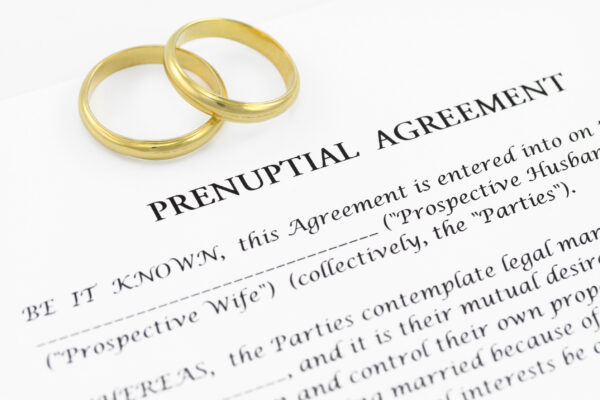
In popular culture, "prenups" are usually associated with the rich and famous, but in real life, they're becoming more common among ordinary people, especially among younger people. The New Yorker reported last year that nearly 40% of married and engaged Americans between 18 and 34 have signed a prenuptial agreement. It seems that many, including Hoosiers, are deciding that signing a prenup is a good idea.
That doesn't mean they're for everyone, of course, but at the very least, you should know your options. If you're considering signing a prenuptial or postnuptial agreement, our experienced family law attorneys can help.
What is a prenuptial agreement?
A prenuptial agreement, sometimes also called a premarital or antenuptial agreement, is simply a contract signed by a couple prior to marriage that outlines how assets and debts should be handled if the marriage ends in divorce. Prenuptial agreements can address division of property, spousal support (alimony), retirement accounts, debt, attorney's fees, and other financial aspects of a potential divorce. They can also contain provisions for what happens in the event of infidelity.
A postnuptial agreement is similar to a prenup, but entered during the marriage. A postnuptial agreement can also modify a previous prenup or postnup.
Notably, your prenuptial agreement cannot address child custody or child support. Those decisions are made based on the best interests of the child, and you cannot sign away your children's rights in a contract.
Reasons you might want a prenuptial agreement:
Not every married couple needs a prenuptial agreement, but there are numerous situations where a prenup can be helpful. Some common reasons to sign a prenup include:
- If you own a business, a well-written prenuptial agreement can keep your business separate from your marriage or specify how business assets will be divided.
- If you or your spouse has significant debt, a prenuptial agreement can help shield the other spouse from debt collectors.
- If you have children from a previous relationship, a prenup can help to protect their inheritance.
- If you have significant retirement assets, a prenup can reduce the probability that a potential divorce will force you to delay your retirement.
- In the event of a divorce, a prenup can make the legal process smoother and less costly.
Again, that doesn't mean prenuptial agreements are for everyone. You may be okay with letting state law govern your potential divorce instead of signing a separate contract. Some couples feel that signing a prenup undermines the trust and romance of their relationship, or are opposed for moral or religious reasons. You may also not want to feel "locked in" to a prenup — although it's worth noting again that a prenup can be changed later with a postnup, if desired.
Talk to an experienced family law attorney about your prenuptial agreement
Whether you ultimately decide to sign a prenup or not, remember that a poorly written prenup can do more harm than good. It's best for both parties to have legal advice, for two reasons.
First, you need an attorney familiar with Indiana law to make sure your prenuptial agreement complies with the law and doesn't include any illegal provisions to make sure it's enforceable. Otherwise, you might find out that your prenup is invalid at the worst possible time (that is, during divorce proceedings).
Second, if both parties have an attorney, it's much harder to try to get the prenup invalidated on the grounds that one party didn't know what they were signing or didn't sign voluntarily.
In short, if you're considering a prenuptial or postnuptial agreement, talk to a lawyer about your rights and options. Give us a call or contact us online to speak with a family law attorney at Hocker Law, LLC.
